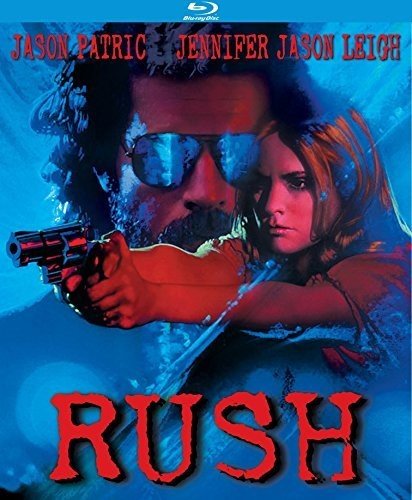
Written by Kristen Lopez
Reflecting the times, the cinematic landscape of the 1990s found itself awash in drugs (on-screen, at least). On the heels of films like Goodfellas and New Jack City, director Lili Fini Zanuck directed Rush. Despite a setting in 1975, Rush is very 1990s in its actors – popular stars Jennifer Jason Leigh and Jason Patric – as well as starring roles for Gregg Allman and a soundtrack by Eric Clapton in his somber phase. Dated, to be sure, Rush is a slow burn that, had the budget and script gone bigger, could have presented some intriguing socio-political examinations regarding police corruption and how cops sabotage drug busts, created a cocaine soaked version of the American Dream. Instead, this becomes an interesting relationship drama in the vein of Badlands that, while slow, yields great performances.
Katterly, Texas. 1975. Undercover police officers Jim Raynor and Kristen Cates (Patric and Leigh) are tasked with taking down a nefarious drug lord named Will Gaines (Allman). Unfortunately, to get ingratiated into Gaines’ network, the two are forced to take the drugs they sell, turning them into junkies. As they struggle to make their case and remain sober, their lives are soon placed in danger.
This was the only film directed by Fini Zanuck, widow of acclaimed Hollywood legend/producer Richard D. Zanuck. That pedigree alone should have put the movie at an advantage regarding cast and script, but Rush plays like a small production. (It’s said Tom Cruise turned down the role due to its drug content.) There’s no compositional flair with the camera. In fact, I’d be hard pressed to say there’s more than two cameras filming considering the lack of close-ups or any other blocking short of two-shots and the like. There’s also no commitment to the 1970s aesthetic, although that could be more of an issue with the time period. Several films set in obscure eras during this period didn’t always look or feel like they were set there.
This is an incredibly 1990s movie, and not in the way something like Clueless is. Compared to other drug movies, there’s no flash regarding the drug culture, advantageous as it allows us time to focus on the characters. Despite Patric’s top billing this is really Jennifer Jason Leigh’s film. Her neophyte cop, Kristen Cates, starts the film repulsed yet fascinated by the drug lifestyle. When Jim shows her how to shoot up, the mix of revulsion and intrigue comes across. This doesn’t turn you against her, but you understand her motivations. Leigh, more than anyone, holds your sympathy the entire film, as she’s the lone character who transforms. We meet Jim fully formed, in the throes of a lifestyle that’s going to kill him, either directly or through shady dealings, but there’s a light at the end for Kristen. Her disintegration into a lovesick Florence Nightingale, nursing her junkie boyfriend and seeking revenge, demeans her character a bit too much, but Leigh holds back before it becomes too maudlin.
Like those who grew up on Scarface and the like, there is an inherent attraction to the world of drugs as it’s usually bound up with money and fame. In the small town of Katterly, drug culture is so casual as to be a means of saying “hello.” In fact, Jim barely asks how someone’s doing before asking if they’re holding anything. Although we’re not privy to the town’s economy and the like, the abundance of trailers, small-town dive bars, and grime implies a city where drugs are the only escape outside of dying.
At two hours you’d be hard pressed to find any discernible plot. You know the two cops are trying to make a case against Gaines, but everything from there boasts a tenuous connection. More content to depict a way of life, the script lacks any narrative teeth. Gaines never comes off like a formidable foe, and Gregg Allman only has a handful of lines. In fact, outside of walking in or out of a club, we don’t actually get a good look at him until the concluding court case. The script wants to play with ambiguity. Maybe Gaines isn’t the boogeyman the cops have set him up as; maybe Kristen and Jim’s superiors are just set against him for their own reasons. By the end, we’re never sure either way. There’s also a hokey love story, because we all know two cops of the opposite gender can’t be friends, culminating in one of the unsexiest “love” scenes I’ve watched.
Okay, so the plot stinks, but no one ever passes judgment on the two characters lost in the haze, which is great. Too often, drug movies preach abstinence or condemn those who are drug users as villainous, weak, or damaged. Jim and Kristen take drugs because they know the dealers won’t trust them without “testing the merchandise.” (Although, how did their superiors not assume this would happen?) Because we’re never privy to their lives before, we’re left with what we know and Kristen doesn’t have the damaged mien of someone born for that lifestyle. You end up blaming their superiors – one played by Sam Elliot – more than anyone else. When the two finally confess to Jim’s addiction, their chief decides a prayer circle and a few days off will fix everything. The script castigates those so determined to catch one big fish, they don’t worry about who they hurt. Conversely, Jim’s own one-track mind on getting Gaines – the don’t collar any till they “Get them all” – gives him a perpetual excuse to stay high.
Not as gritty, flashy, or esoteric as it could be, Rush is a fine experiment in showing a culture as opposed to a film. Jennifer Jason Leigh shines, and the absence of judgment on the characters is refreshing. Kino’s new Blu-ray release of the film looks gorgeous. If you’re sick of watching the ersatz “glamour” of the drug trade, give this a view.